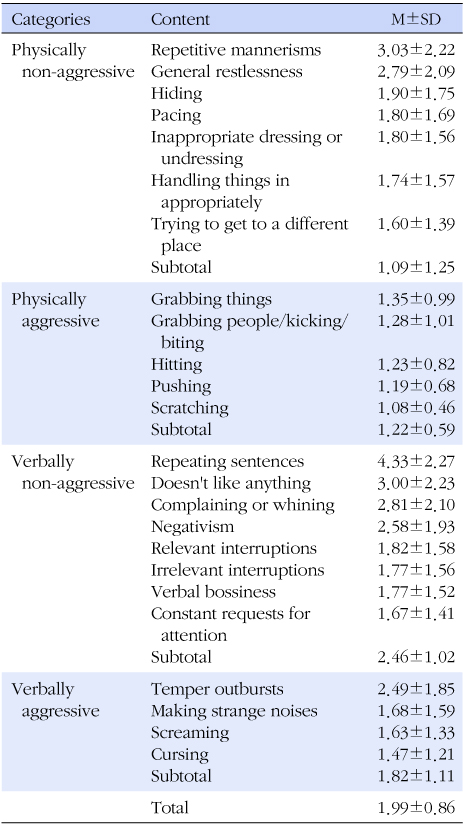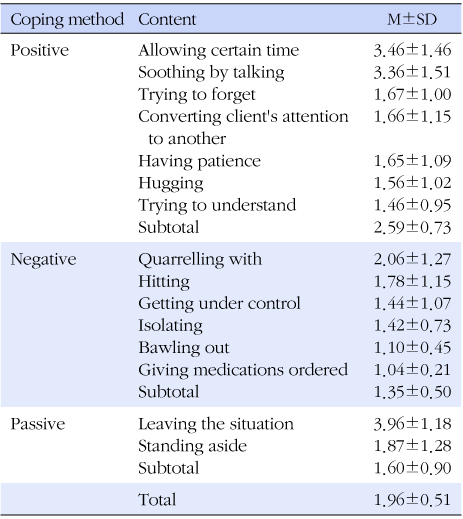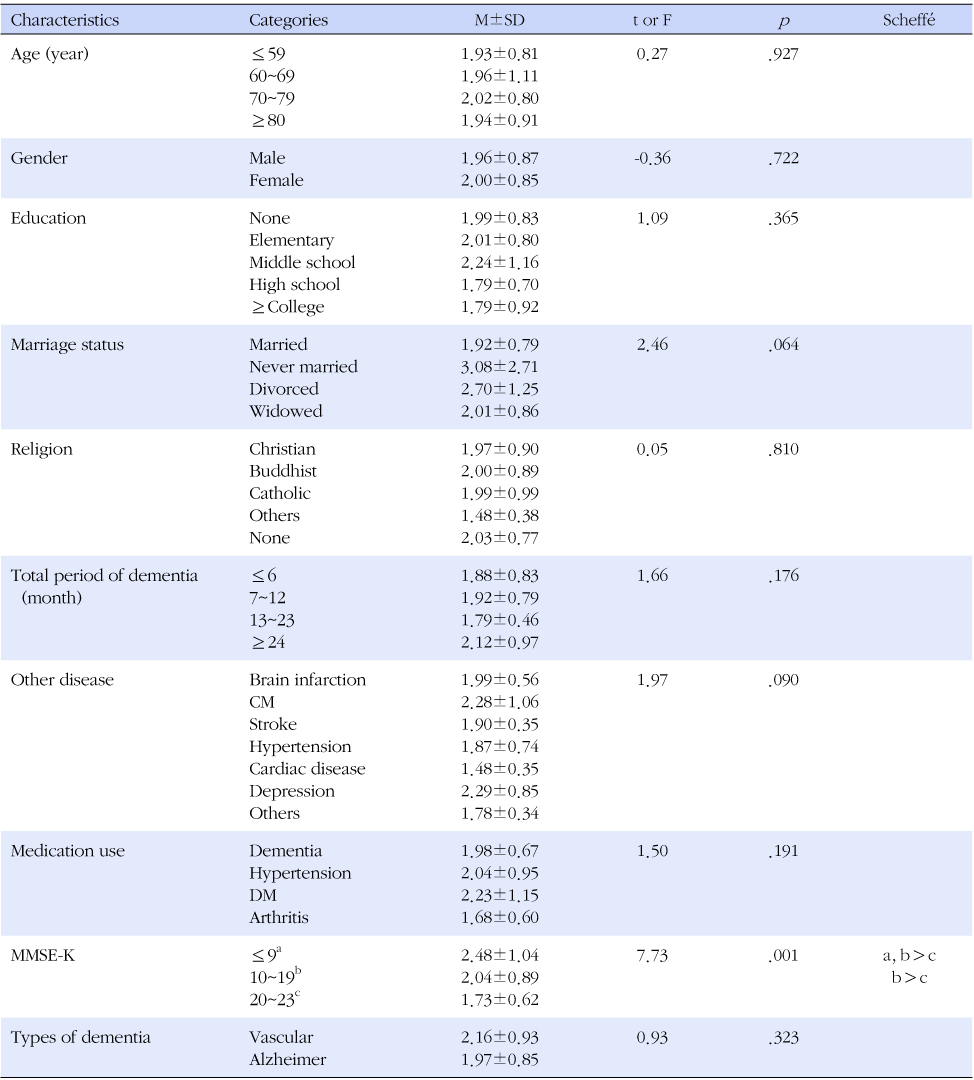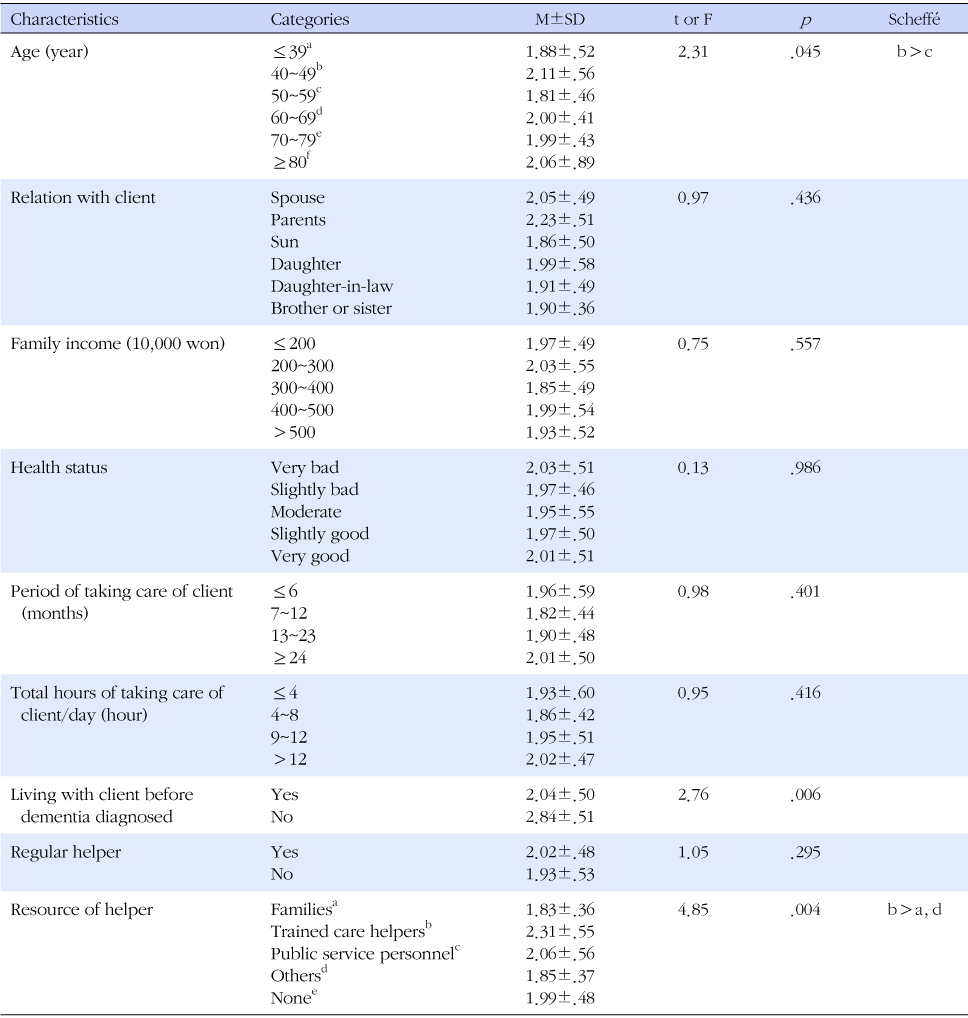Articles
- Page Path
- HOME > J Korean Acad Community Health Nurs > Volume 23(3); 2012 > Article
-
Original Article
- Agitation in Home-dwelling Persons with Dementia and Coping Behaviors in Primary Care-givers to the Agitation
- Hye Suk Kim, Heeok Park
-
Journal of Korean Academy of Community Health Nursing 2012;23(3):256-265.
DOI: https://doi.org/10.0000/jkachn.2012.23.3.256
Published online: September 30, 2012
1Keimyung University Dongsan Hospital, Daegu, Korea.
2College of Nursing, Keimyung University, Daegu, Korea.
• Received: March 30, 2012 • Accepted: September 5, 2012
Copyright © 2012 Korean Academy of Community Health Nursing
- 237 Views
- 0 Download
Abstract
-
Purpose
- The purpose of this study was to investigate agitation in home-dwelling persons with dementia and coping behaviors of primary family care-givers to agitation.
-
Methods
- The research was designed as a descriptive study. A total of two hundred and five subjects had participated in this study. To measure agitation in persons with dementia, Cohen-Mansfield Agitation Inventory was used. To measure coping behaviors of primary family care-givers to the agitation, a questionnaire was used. Descriptive statistics, t-test, ANOVA, Scheffé test were used to answer the research objectives.
-
Results
- 'Repetitive mannerisms' and 'repeating sentences' were the most commonly occurred agitation in home-dwelling persons with dementia. 'Leaving the situation', 'allowing certain time', and 'soothing by talking' were the most common coping behaviors occurred in primary care-givers.
-
Conclusion
- The findings of the current study would provide meaningful data to develop nursing programs to control agitation for home-dwelling persons with dementia and education programs for primary care-givers to cope with persons' agitation.
- 1. Testad I, Aasland AM, Aarsland D. Prevalence and correlated of disruptive behavior in patients in Norwegian nursing homes. Int J Geriatr Psychiatry 2007;22(9):916–921.
- 2. Byeon YS, Nam JJ. A study on disturbing behaviors and environment characteristics in elderly people with dementia. The Korean Journal of Fundamentals of Nursing 2002;9(2):246–265.
- 3. Cheon JS, Jo SG, Song HR, Oh BH. Caregiver burden for dementia patients. Journal of Korean Geriatric Psychiatry 2003;7(2):154–163.
- 4. Cohen-Mansfield J, Libin A. Verbal and physical non-aggressive agitated behaviors in elderly persons with dementia: Robustness of syndromes. Journal of Psychiatric Research 2005;39(2):325–332.
- 5. Cohen-Mansfield J, Marx MS, Rosenthal AS. A description of agitation in a nursing home. Journal of Gerontological Medical Science 1989;44(3):M77–M84.
- 6. Cohen-Mansfield J, Werner P, Watson V, Pasis S. Agitation in participants of adult day care centers: The experiences of relatives and staff members. International Psychogeriatrics 1995;7(2):447–458.
- 7. Hamel M, Gold DP, Andres D, Reis M, Dastoor D, Grauer H, et al. Predictors and consequences of aggressive behavior by community-based dementia patients. Gerontologist 1990;30(2):206–211.
- 8. Homes C, Hopkins V, MacLaughlin V, Wikinson D, Rosenvinge H. Lavender oil as a treatment for agitation behavior in severe dementia. International Journal of Geriatric Psychiatry 2002;17(4):305–308.
- 9. Jung JH. A study on the actual conditions of care on problematic behaviors of the elderly with dementia in the nursing institutions for the aged 2009;Seoul: Myongji University; Unpublished master's thesis.
- 10. Kang YS. A study on disturbing behaviors of demented elderly staying at home 2000;Busan: Pusan University; Unpublished doctoral dissertation.
- 11. Kim HS. Elder abuse due to care giving burden of the caregiver with the dementia elderly 2002;Gyeongju: Silla University; Unpublished master's thesis.
- 12. Kim KA. Development of an assessment tool of problematic behaviors for institutionalized old people with dementia 2003;Seoul: Seoul University; Unpublished doctoral dissertation.
- 13. Kim KS, Choi ES, Park SA. A study on behavioral and psychological symptom of dementia (BPSD) among dementia elderly in an institutional setting. Korean Journal of Research in Gerontology 2007;27(1):137–152.
- 14. Kim MG, Lee SS, Lee YH, Lee SK, Ahn DS, Yoon SH, et al. An investigation to the diagnostic validity of MMSE-K and the psychopathology in a group of urban patients with dementia of Alzheimer type. Journal of Korean Neuropsychiatric Association 1998;37(6):1277–1291.
- 15. Kim NC, Yoo YS, Hahn SW. The effect of reminiscence with audio-visual stimulation on senile dementia. Journal of Korean Academy of Nursing 2000;30(1):98–109.
- 16. Kim SO. A study on the effect of light therapy on agitated behavior & sleep disturbance of demented elderly. Korean Academy of Psychiatric and Mental Health Nursing 2001;10(3):303–316.
- 17. Lee AK. Needs of caregivers of patients with Alzheimer's disease for nursing home facilities 2003;Seoul: Yonsei University; Unpublished master's thesis.
- 18. Lee YH. Dementia patient's aggressive behavior and a coping behavior of dementia care-worker who experienced it 2003;Busan: Kosin University; Unpublished master's thesis.
- 19. Menagham EG. Marital stress and family transaction: A panel analysis. Journal of Marriage and the Family 1983;45(2):371–385.
- 20. Oh H, Sok SH. Health condition, burden of caring, and the quality of life among family members of the elderly with senile dementia. Korean Academy of Psychiatric and Mental Health Nursing 2009;18(2):157–166.
- 21. Oh JJ. Aggressive behavior of dementia patients in a facility. Korea Community Health Nursing Academic Society 1998;12(2):172–184.
- 22. Oh JJ. The experience of nursing staff on the dementia patients' aggressive behavior. Journal of Korean Academy of Nursing 2000;30(2):293–306.
- 23. Park HO. Aggressive behavior patterns and management in patients with dementia 2002;Seoul: Yonsei University; Unpublished master's thesis.
- 24. Park HO, Specht JK. Effect of individualized music on agitation in individuals with dementia who live at home. Journal of Gerontological Nursing 2009;35(8):47–55.
- 25. Ryden MB. Aggressive behavior in person with dementia who live in the community. Alzheimer disease and associated disorders 1988;2(4):342–355.
- 26. Statistics. Statistics of aging 2010;Retrieved May 25, 2011. from http://www.kostat.go.kr
- 27. Twelftree H, Qazi A. Relationship between anxiety and agitation in dementia. Aging & Mental Health 2006;10(4):362–367.
- 28. Whall AL, Gillis GL, Yankou D, Booth DE, Beel-Bates CA. Disruptive behavior in elderly nursing residents: A survey of nursing staff. Journal of Gerontological Nursing 1992;18(10):13–17.
- 29. Yang S. Care of the senile dementia patient in the community. Journal of Korean Academy of Nursing 1995;4(1):23–30.
- 30. Yu F, Kolanowski AM, Litaker M. The association of physical function with agitation and passivity in nursing home residents with dementia. Journal of Gerontological Nursing 2006;32(12):30–36.
Figure & Data
References
Citations
Citations to this article as recorded by 


 KACHN
KACHN




 PubReader
PubReader Cite
Cite

